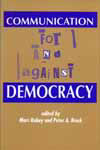

|
|

Communication for and Against Democracy
Raboy, Marc and Bruck, Peter A. (ed.)
Publisher: Black Rose Books, Montreal, CanadaYear Published: 1989 Pages: 248pp Price: $19.95 ISBN: ISBN 0-921689-46-2 Resource Type: Book Cx Number: CX4110 This anthology explores the circumstances in which communication serves at times as an instrument of repression and domination, and at others as a support for human emancipation. Abstract: "The need to understand and cope with the mainstream media, grassroots communication strategies, the military uses of new communication technologies, and the globalization of culture, as reflected in its mass-mediated forms, is a matter of urgency." This anthology explores the circumstances in which communication serves at times as an instrument of repression and domination, and at others as a support for human emancipation. The introductory chapter describes the challenge of democratic communication and the general direction of a critical and activist agenda. Divided into three categories, the anthology's articles use concrete examples to illustrate different aspects of the structure of communication within an increasingly global social system; of media production and output; and of activist work in various widely-dispersed situations (from a large media organization to a community in Soviet Armenia). Some of the topics covered include the implications for communication of the Canada-U.S. free trade agreement, the U.S. use of media in its war in Central America, the limits to understanding issues imposed by television news, and the possibilities of using media in the promotion of social change. Written by an international range of experts, scholars, and activists, this book grew out of a conference of the Union for Democratic Communication. Table of Contents Preface Editors' Introduction Peter A. Bruck and Marc Raboy: The Challenge of Democratic Communication Contexts of Domination Howard H. Frederick: "Development Sabotage Communication" in Low Intensity Warfare: Media Strategies Against Democracy in Central America Vincent Mosco: Critical Thinking About the Military Information Society: How Star Wars is Working Oscar H. Gandy, Jr.: Information Privacy and the Crisis of Control Wai-Teng Leong: The Culture of the State: National Tourism and the State Manufacture of Cultures Lanie Patrick: Global Economy, Global Communications: The Canada-U.S. Free Trade Agreement Understanding Communication Graham Knight: The Reality Effects of Tabloid Television News Douglas Kellner: Resurrecting McLuhan? Jean Baudrillard and the Academy of Postmodernism Gertrude J. Robinson and Claude-Yves Charron: Television News and the Public Sphere: The Case of the Quebec Referendum Luigi Manca: Journalism, Advocacy, and a Communication Model for Democracy Contexts Of Liberation Robert Lewis Shayon: The Education of a Media Activist Levon Chorbajian: For the Masses: Television in the Armenian S.S.R. Keyan G. Tomaselli and P. Eric Louw: Alternative Press and Political Practice: The South African Struggle Lorna Roth and Gail Guthrie Valaskakis: Aboriginal Broadcasting in Canada: A Case Study in Democratization Geoff Mulgan: What is Socialist Cultural Practice: Does Anyone Have a Right to be an Artist? Notes on Contributors Subject Headings
|